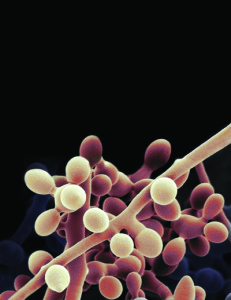WALNUT CREEK, Calif.—The nation’s Renewable Fuels Standard calls for annual production of 36 billion gallons of biofuel by 2022. One of the biggest hurdles to achieving this goal lies in optimizing the multistep process involved in breaking down plant biomass and then converting it into fermentable sugars that can be refined into fuel for our transportation needs. To overcome this challenge, the U.S. Department of Energy supports several projects focused on identifying enzymes from fungi and microbes such as cellulases—that breakdown plant cell walls—and heat-tolerant industrial-strength host cell systems to drive these reactions.
Many of the cellulases currently used in biofuel production are derived from species that thrive at temperatures of 20°C-35°C (68°F-95°F) which is room temperature to nearly body temperature. The conversion process at these temperatures takes time, during which contaminants can reduce the final yield. To speed up the conversion process, researchers propose raising the temperature, which in turn requires enzymes that are stable above current working conditions. They now appear to be on the right track.
Published online October 2 in Nature Biotechnology, an international team of scientists including DOE JGI researchers compared the finished genomes of Thielavia terrestris and Myceliophthora thermophila, fungi that thrive in high-temperature environments above 45°C and whose enzymes, active at temperatures ranging from 40 °C to 75 °C, would therefore be useful for accelerating (thus improving) the biofuel production process.
“Thermostable enzymes and thermophilic cell factories may afford economic advantages in the production of many chemicals and biomass-based fuels,” wrote the team that includes DOE JGI Fungal Genomics head Igor Grigoriev as well as longtime collaborators Randy Berka from Novozymes in Davis, Calif. and Adrian Tsang of Concordia University in Canada. As these published genomes represent the first to be fully finished for filamentous fungi, they added that the information will be useful in improving strains as well as simplifying the identification of beneficial as well as harmful mutations.
The 38.7-million base pair (Mbp) genome of M. thermophila and the 36.9 Mbp genome of T. terrestris, the first described for thermophilic eukaryotes, encode a multitude of enzymes that decompose biomass material. “Thermophilic fungi are well-known composting organisms, and their usefulness as a reservoir for thermotolerant enzymes was established decades ago,” Berka noted. “These two thermophiles can be considered all-purpose decomposers with respect to their carbohydrate-active enzymes (CAZymes) and their ability to degrade plant polysaccharides.”
The efficacy of fungal enzymes was also tested on feedstocks representing the two major groups of flowering plants under a variety of temperatures. The researchers found that compared to the other fungal cellulases, the enzymes in M. thermophila and T. terrestris have evolved to efficiently break down and convert biomass into simple sugars at a wide range of temperatures. “Since these thermophiles are much more efficient than other cellulose degraders in breaking down cellulosic biomass, their enzymes are likely to be more active than known cellulases and/or they have developed new strategies for biomass degradation,” suggested Tsang.
One of the team’s findings from the comparative analysis involved the expanded size of one glycoside hydrolase family in the two thermophilic fungi compared to the more familiar (and already sequenced) fungus T. reesei. As hydrolysis is the chemical reaction by which simple, fermentable sugars are released from a polysaccharide, the researchers suggest this expansion “may have evolved as a modified strategy for deconstruction of biomass polysaccharides compared to that of other species such as T. reesei.” In light of these results, the researchers concluded, M. thermophila and T. terrestris would be very useful to large-scale biofuel production.
“These thermophilic fungi represent excellent hosts for biorefineries where biomass is converted to biofuels as an alternative to modern oil refineries,” said Grigoriev. “The fact that these organisms not only deliver a broad spectrum of heat-tolerant enzymes but can also host new enzymes and be optimized for industrial processes holds great promise for significant improvements over existing systems.”
The U.S. Department of Energy Joint Genome Institute, supported by the DOE Office of Science, is committed to advancing genomics in support of DOE missions related to clean energy generation and environmental characterization and cleanup. DOE JGI, headquartered in Walnut Creek, Calif., provides integrated high-throughput sequencing and computational analysis that enable systems-based scientific approaches to these challenges. Follow DOE JGI on Twitter.
